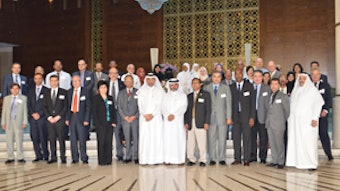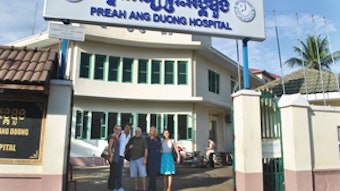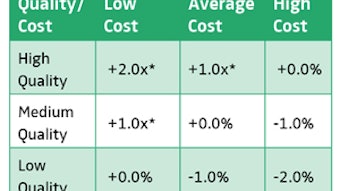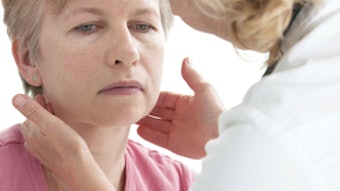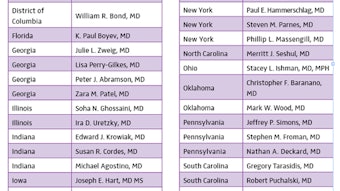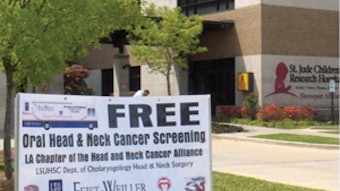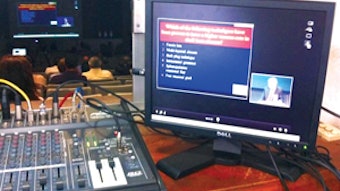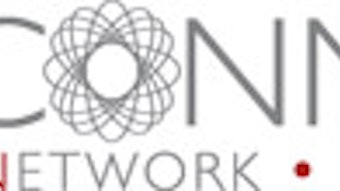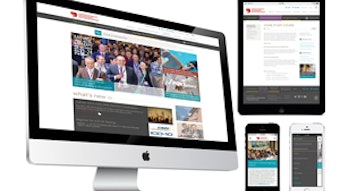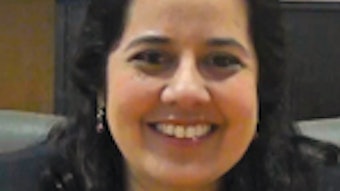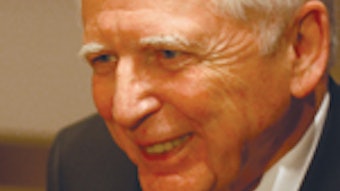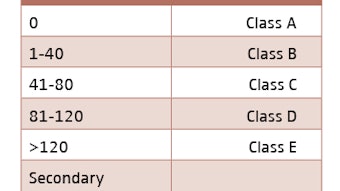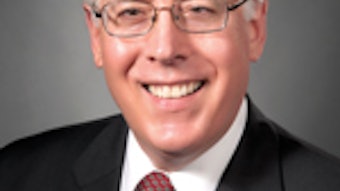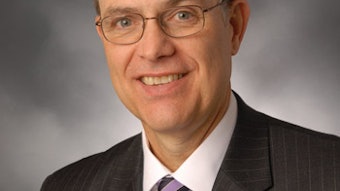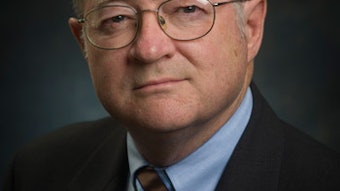Building Strategy for CHEER with the World Café Construct
David L. Witsell, MD, MHS Kristine Schulz, MPH “Strategy making is uncomfortable; it’s about taking risks and facing the unknown. Unsurprisingly, managers try to turn it into a comfortable set of activities. But reassurance won’t deliver performance…reconcile yourself to feeling uncomfortable.” (Harvard Business Review, January-February 2014, The Big Lie of Strategic Planning) Principles of the World Café Format Set the context Create the space Define the questions of importance Encourage courage to speak Connect perspectives and conversation Listen together Harvest and integrate discoveries In mid-January 2014, CHEER (Creating Healthcare Excellence through Education and Research) conducted a strategic planning meeting at our Academy headquarters in Alexandria, VA. CHEER is a practice-based research network of 30 academic and community sites across the country—the training, education, and regulatory program for CHEER is supported by an NIH grant. In its second five-year funding cycle, CHEER has begun to make our mark as the only practice-based research network in otolaryngology with multiple publications; a successful >1,500 patient pilot study in dizziness and tinnitus; a 750,000 visits administrative database; a voice therapy study near completion; and a sudden hearing loss study under way. However, we know that to grow our success and be sustainable in today’s environment, we need to be innovative and dynamic. We all recognize that strategic planning can be one of those “groan” activities that is necessary, can be tedious, and does not always arrive at actionable steps within an identified strategic goal. CHEER wanted to create an environment for a different experience that could facilitate rapid exchange of information and ideas, as well as build key relationships and allow personal investments to be realized. We embraced “feeling uncomfortable” to ensure an open and honest exchange of information from which true strategies could emerge. To do this, we used a “World Café” format to facilitate the gathering of collective wisdom that can emerge from conversational leadership. To set the context for the World Café, all the right stakeholders need to be in the room. For CHEER, that included the newly established AAO-HNSF Practice-based Task Force, The CHEER executive team, and AAO-HNS leadership. There were 17 participants in all. The physical space for the meeting was set up with four “café” tables complete with working paper tablecloths and marking pens. Before the actual meeting, each participant provided a fair analysis of CHEER and where the strengths, opportunities, weaknesses, and threats lie. Responses were summarized prior to the meeting with the goal to use these four key challenge groupings to catalyze discussion. Our group divided itself among the four tables and each table was given the same challenge grouping to discuss for 10 minutes. They were encouraged to write their thoughts down on the “tablecloth.” After 10 minutes, one person stayed at that table to host and summarize the group’s ideas and the other three participants separated and went to each of the other café tables. The conversations then began again for 10 minutes. Each key challenge grouping had three rounds of conversations with a different mix of participants. Significant and robust cross talk, exchange of perspective, and dispersion of ideas resulted. At the end of the speed rounds, one person was asked to summarize to the entire group the salient points that were discussed and written down at his or her table. Actionable strategies were identified for each key challenge. Places to invest and places to not expend resources were clear; novel consensus-based ideas were brought forward and began maturation. One of the specific aims of the CHEER network is to build new contemporary leadership and an organizational structure that can address the research and healthcare challenges that face us every day. We are practice-based, an evolving and involving network of colleagues that collaborate and seek to address the needs for effective care. Conversation is of the utmost importance and is the only way to build and create a dialogue for healthcare excellence. The World Café process is a consensus- and relationship-building activity that enables each participant to lead from a personal perspective in a respectful and fun way. We emerged with eight strategies that leverage internal strengths and external opportunities to mitigate internal weaknesses and external threats. One exciting strategy is to explore the development of a nonprofit organizational model that would potentially reduce overhead costs and provide a structure for ownership of the network. Another innovative strategy is to develop a “priority project portfolio”—a compendium of vetted project plans (and budgets) of importance to the AAO-HNSF (and feasible in the practice setting) that can be marketed for outside support or used as the basis for a grant. Two programs of note provide a foundation for CHEER leadership development: Leading Organizations to Health (www.lohweb.com) led by Tony Suchman, MD; Penny Williamson, ScD; and Diane Rawlins, and Courage to Lead (http://www.couragerenewal.org/events/couragetolead-series-ma-2014-16-1) led by Penny Williamson, ScD, and Hanna Sherman, MD. These are dynamic advanced leadership programs for healthcare leaders, primarily physicians, stretching more than 12 and 15 months respectively through a series of intensive retreats. Only 10 to 12 participants are enrolled in each program each year providing for an intimate and accountable experience. You cannot escape the learning. The programs are resources that our medicine colleagues have tapped into and now several otolaryngologists have participated. Leadership is important, and better when not driven by dogma, but conversation. This is so important that NIDCD recognized and funded leadership development as a specific aim for the CHEER grant. Both Tony Suchman and Penny Williamson are CHEER consultants and helped to design the program to launch the Practice-based Task Force for the AAO-HNSF. We began this meeting with personal stories of leadership…but that is another article all together! For more information on CHEER, visit www.cheerresearch.org or email Kristine Schulz at kristine.schulz@duke.edu.
David L. Witsell, MD, MHS
Kristine Schulz, MPH
“Strategy making is uncomfortable; it’s about taking risks and facing the unknown. Unsurprisingly, managers try to turn it into a comfortable set of activities. But reassurance won’t deliver performance…reconcile yourself to feeling uncomfortable.” (Harvard Business Review, January-February 2014, The Big Lie of Strategic Planning)
Principles of the World Café Format
Set the context
Create the space
Define the questions of importance
Encourage courage to speak
Connect perspectives and conversation
Listen together
Harvest and integrate discoveries
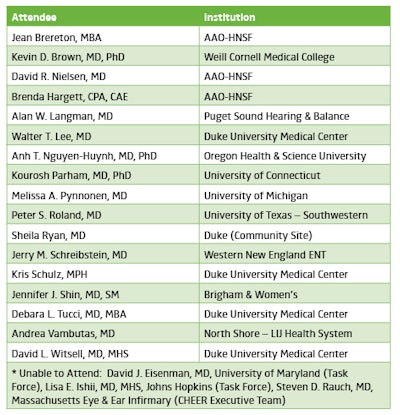
We all recognize that strategic planning can be one of those “groan” activities that is necessary, can be tedious, and does not always arrive at actionable steps within an identified strategic goal. CHEER wanted to create an environment for a different experience that could facilitate rapid exchange of information and ideas, as well as build key relationships and allow personal investments to be realized. We embraced “feeling uncomfortable” to ensure an open and honest exchange of information from which true strategies could emerge. To do this, we used a “World Café” format to facilitate the gathering of collective wisdom that can emerge from conversational leadership.
To set the context for the World Café, all the right stakeholders need to be in the room. For CHEER, that included the newly established AAO-HNSF Practice-based Task Force, The CHEER executive team, and AAO-HNS leadership. There were 17 participants in all. The physical space for the meeting was set up with four “café” tables complete with working paper tablecloths and marking pens. Before the actual meeting, each participant provided a fair analysis of CHEER and where the strengths, opportunities, weaknesses, and threats lie. Responses were summarized prior to the meeting with the goal to use these four key challenge groupings to catalyze discussion.
Our group divided itself among the four tables and each table was given the same challenge grouping to discuss for 10 minutes. They were encouraged to write their thoughts down on the “tablecloth.” After 10 minutes, one person stayed at that table to host and summarize the group’s ideas and the other three participants separated and went to each of the other café tables. The conversations then began again for 10 minutes. Each key challenge grouping had three rounds of conversations with a different mix of participants. Significant and robust cross talk, exchange of perspective, and dispersion of ideas resulted. At the end of the speed rounds, one person was asked to summarize to the entire group the salient points that were discussed and written down at his or her table.
Actionable strategies were identified for each key challenge. Places to invest and places to not expend resources were clear; novel consensus-based ideas were brought forward and began maturation.
One of the specific aims of the CHEER network is to build new contemporary leadership and an organizational structure that can address the research and healthcare challenges that face us every day. We are practice-based, an evolving and involving network of colleagues that collaborate and seek to address the needs for effective care. Conversation is of the utmost importance and is the only way to build and create a dialogue for healthcare excellence. The World Café process is a consensus- and relationship-building activity that enables each participant to lead from a personal perspective in a respectful and fun way. We emerged with eight strategies that leverage internal strengths and external opportunities to mitigate internal weaknesses and external threats.
One exciting strategy is to explore the development of a nonprofit organizational model that would potentially reduce overhead costs and provide a structure for ownership of the network. Another innovative strategy is to develop a “priority project portfolio”—a compendium of vetted project plans (and budgets) of importance to the AAO-HNSF (and feasible in the practice setting) that can be marketed for outside support or used as the basis for a grant.
Two programs of note provide a foundation for CHEER leadership development: Leading Organizations to Health (www.lohweb.com) led by Tony Suchman, MD; Penny Williamson, ScD; and Diane Rawlins, and Courage to Lead (http://www.couragerenewal.org/events/couragetolead-series-ma-2014-16-1) led by Penny Williamson, ScD, and Hanna Sherman, MD. These are dynamic advanced leadership programs for healthcare leaders, primarily physicians, stretching more than 12 and 15 months respectively through a series of intensive retreats. Only 10 to 12 participants are enrolled in each program each year providing for an intimate and accountable experience. You cannot escape the learning. The programs are resources that our medicine colleagues have tapped into and now several otolaryngologists have participated.
Leadership is important, and better when not driven by dogma, but conversation. This is so important that NIDCD recognized and funded leadership development as a specific aim for the CHEER grant. Both Tony Suchman and Penny Williamson are CHEER consultants and helped to design the program to launch the Practice-based Task Force for the AAO-HNSF. We began this meeting with personal stories of leadership…but that is another article all together!
For more information on CHEER, visit www.cheerresearch.org or email Kristine Schulz at kristine.schulz@duke.edu.
